
Jeffrey Ross Hyman, known professionally as Joey Ramone, was an American singer, songwriter, and the lead vocalist and founding member of the punk rock band Ramones. Having co-founded the Ramones with Johnny Ramone and Dee Dee Ramone in 1974, his image, voice, and tenure with the Ramones made him a countercultural icon.

Douglas Glenn Colvin, better known by his stage name Dee Dee Ramone, was an American musician. He was the bassist and a founding member of the punk rock band the Ramones. Throughout the band's existence, he was the most prolific lyricist and composer, writing many of their best-known songs, such as "53rd & 3rd", "Chinese Rock", "Commando", "Wart Hog", "Rockaway Beach", "Poison Heart" and "Bonzo Goes To Bitburg". The latter won the New York Music Award for best independent single of the year in 1986, while Animal Boy, which the song is from, won for best album.
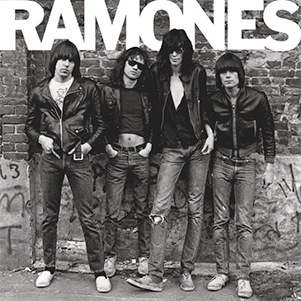
Ramones is the debut studio album by the American punk rock band Ramones, released on April 23, 1976, by Sire Records. After Hit Parader editor Lisa Robinson saw the band at a gig in New York City, she wrote several articles about the group and asked Danny Fields to be their manager. Fields agreed and convinced Craig Leon to produce Ramones, and the band recorded a demo for prospective record labels. Leon persuaded Sire president Seymour Stein to listen to the band perform, and he later offered the band a recording contract. The Ramones began recording in January 1976, needing only seven days and $6,400 to record the album.

End of the Century is the fifth studio album by the American punk rock band Ramones, released on February 4, 1980, through Sire Records. The album was the band's first to be produced by Phil Spector, though he had offered the band his assistance earlier in their career. With Spector fully producing the album, it was the first release that excluded original member Tommy Ramone, who had left the band in 1978 but had produced their previous album Road to Ruin. Spector used more advanced standards of engineering, such as high-quality overdubbing and echo chambers. These painstaking methods caused conflict between the band and Spector since the Ramones were accustomed to a quicker recording process. Spector emphasized the production value as well, working with a budget of around $200,000, far exceeding their earlier album sessions.

Marc Steven Bell is an American drummer. He began playing in hard rock bands in the New York City area, notably Dust and Estus. He was asked to drum for punk rock band Richard Hell and the Voidoids. He replaced drummer Tommy Ramone in the Ramones in 1978, and went by the stage name Marky Ramone from then on. He has also played drums for other punk rock and heavy metal bands, including his own band Marky Ramone and the Intruders. He continues to keep the Ramones legacy alive around the world with his band Marky Ramone's Blitzkrieg.
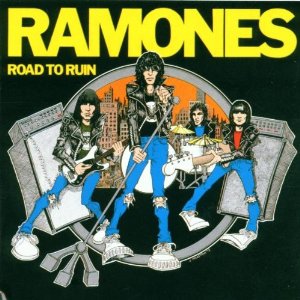
Road to Ruin is the fourth studio album by the American punk rock band Ramones, released on September 22, 1978, through Sire Records as LP record, 8 track cartridge & audio cassette. It was the first Ramones album to feature new drummer Marky Ramone, who replaced Tommy Ramone. Tommy left the band due to low sales of previous albums as well as stress he experienced while touring; however, he stayed with the band to produce the album with Ed Stasium. The artwork's concept was designed by Ramones fan Gus MacDonald and later modified by John Holmstrom to include Marky instead of Tommy.

Thomas Erdelyi, known professionally as Tommy Ramone, was a Hungarian-American musician. He was the drummer for the influential punk rock band the Ramones from its debut in 1974 to 1978, later serving as its producer, and was the longest-surviving original member of the Ramones.

Rap rock is a music genre that developed from the early to mid-1980s, when hip hop DJs incorporated rock records into their routines and rappers began incorporating original and sampled rock instrumentation into hip hop music. Rap rock is considered to be rock music in which lyrics are rapped, rather than sung. The genre achieved its greatest success in the late 1990s and early 2000s.

Halfway to Sanity is the 10th studio album by the American punk rock band Ramones, and their last album to feature drummer Richie Ramone. It was produced by Daniel Rey and released on September 15, 1987, by Sire Records. Recording sessions began that April at Intergalactic Studios in New York City, with the band recording instruments before vocals in order to learn songs more quickly. It fared well on charts outside the United States, but peaked at No. 172 on the Billboard 200.

Subterranean Jungle is the seventh studio album by the American punk rock band Ramones, released by Sire Records on February 23, 1983. Overall, the album featured a return to a somewhat more hard punk rock style compared to the band's previous two albums End of the Century in 1980, and Pleasant Dreams in 1981, which were the most pop-focused of the band's career. This direction was encouraged by guitarist Johnny Ramone. The recording sessions saw disputes between band members, mainly due to struggles with alcohol addiction by Joey Ramone and Marky Ramone, and the drug addiction of Dee Dee Ramone.
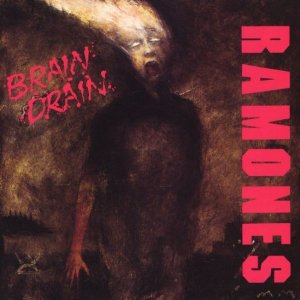
Brain Drain is the eleventh studio album by the American punk rock band Ramones, released on May 23, 1989. It is the last Ramones release to feature bassist/songwriter/vocalist Dee Dee Ramone, the first to feature Marky Ramone since his initial firing from the band after 1983's Subterranean Jungle and the band's last studio album on Sire Records. This was also the last Ramones album to be produced by Daniel Rey, until 1995's ¡Adios Amigos!. The album ends with their unlikely seasonal song "Merry Christmas ".

¡Adios Amigos! is the fourteenth and final studio album by the American punk rock band Ramones. It was released on July 18, 1995, through Radioactive Records. The Ramones disbanded a year after its release and subsequent tour.
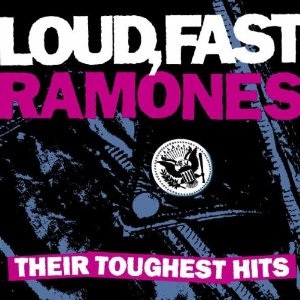
Loud, Fast Ramones: Their Toughest Hits is a compilation of Ramones songs. Curated by Johnny Ramone, the initial 50,000 copies of the album include the 8-song bonus disc Ramones Smash You: Live ’85. The bonus disc features previously unreleased live recordings made on February 25, 1985 at the Lyceum Theatre in London. It is notable for being the only officially released live recording on CD to feature Richie Ramone on drums.
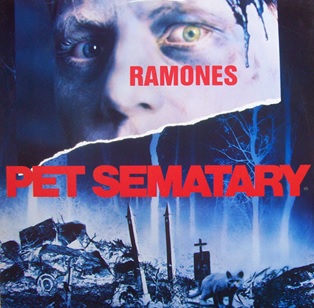
"Pet Sematary" is a single by American punk rock band Ramones, from their 1989 album Brain Drain. The song, originally written for the Stephen King 1989 film adaptation of the same name, became one of the Ramones' biggest radio hits and was a staple of their concerts during the 1990s. The song plays over the film’s credits.

Best of the Chrysalis Years is a compilation album made up of tracks from the Ramones' five albums on Chrysalis Records (UK): Brain Drain, Mondo Bizarro, Acid Eaters, ¡Adios Amigos!, and Loco Live. It was released on May 28, 2002, by EMI International. The album was re-released in 2004 with a new track listing as The Best of The Ramones.
Daniel Rey is an American musician, record producer and songwriter from New York City, best known for his work with the punk rock band Ramones.

"Rock 'n' Roll High School" is a song by American punk rock band Ramones, from the soundtrack album Rock 'n' Roll High School. The single did not chart in the U.S. but peaked at number 67 on the UK Singles Chart.
"Mashed Potato Time" is a 1962 single written by Kal Mann and Bernie Lowe, and performed by Dee Dee Sharp, with backing vocals by The Orlons, on her debut album It's Mashed Potato Time. The song refers to the Mashed Potato dance move, which was a fad. It was one of several songs that at that time that referenced the dance, another being James Brown's "Mashed Potatoes U.S.A." The Marvelettes song "Please Mr. Postman" is mentioned in the lyrics and is copied in the arrangement. Also mentioned in the lyrics are the songs "The Lion Sleeps Tonight" by the Tokens and "Dear Lady Twist" by Gary U.S. Bonds. Sharp recorded a sequel to "Mashed Potato Time" called "Gravy ".
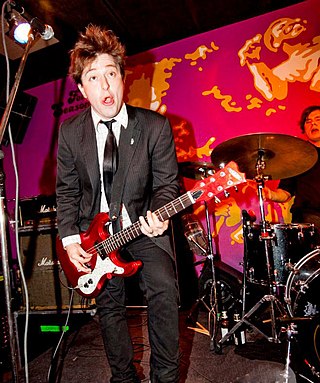
Geoff Palmer, also known by the stage name Geoff Useless, is an American musician from Portsmouth, New Hampshire, now living in Madison, Wisconsin. He played bass and provided backing vocals for The Queers straight out of high school, and played guitar and did lead vocals for The Guts and The Nobodys.

The Ramones were an American punk rock band formed in the New York City neighborhood Forest Hills, Queens in 1974. Known for helping establish the punk movement in the United States and elsewhere, the Ramones are often cited as the first true punk rock band. Although they never achieved significant commercial success, the band is seen today as highly influential in punk culture.


















